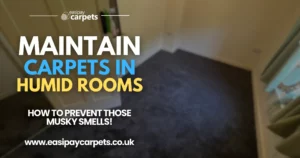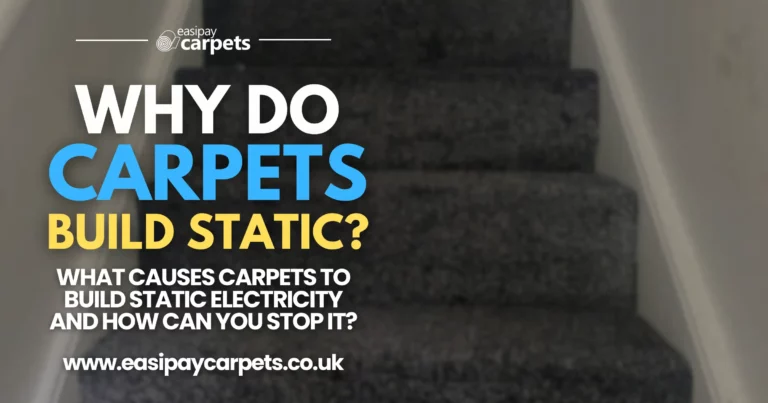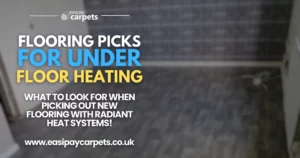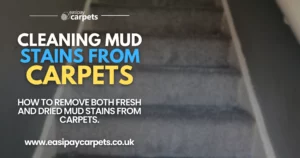

How Carpets Build Static Electricity and How To Stop It
Carpets can make your home feel cosy and comfortable, but they also have a notorious side effect: static electricity. Walking across a carpet and then touching a metal object can result in a sudden and unpleasant shock. This static electricity is more than just an annoyance; it can affect your electronics and even your health. Understanding how carpet builds static electricity and how to stop it is key to creating a more comfortable and safe living environment. In this guide, we’ll explore why carpets generate static, the best ways to reduce static electricity, and practical solutions to prevent those pesky shocks.
Why Does Carpet Cause Static Electricity?
Static electricity occurs when there is an imbalance of electric charges within or on the surface of a material. When it comes to carpets, the build-up of static electricity is influenced by several factors:
Friction Between Carpet and Footwear:
- Description: When you walk across a carpet, especially with certain types of footwear (like rubber-soled shoes), friction is created between the carpet fibres and your shoes. This friction causes electrons to transfer from one material to another, creating a static charge.
- Impact: The build-up of static electricity increases with each step, eventually causing a shock when you touch a conductive object like a doorknob or a metal appliance.
Low Humidity Levels:
- Description: Static electricity is more likely to occur in dry environments with low humidity. This is why static shocks are more common during the winter months when indoor air is typically drier.
- Impact: Dry air doesn’t conduct electricity well, causing static charges to build up instead of dissipating naturally.
Synthetic Carpet Fibres:
- Description: Carpets made from synthetic materials, such as nylon, polyester, or olefin, are more prone to generating static electricity compared to natural fibres like wool.
- Impact: Synthetic fibres tend to hold onto electrons, increasing the likelihood of static build-up.
Insufficient Grounding:
- Description: If there is no proper grounding in your home or the carpet itself, static charges can accumulate instead of dispersing safely into the ground.
- Impact: Lack of grounding contributes to the build-up of static electricity on carpets and other surfaces.
How to Reduce Static Electricity in Carpet
Reducing static electricity in carpets involves addressing the factors that contribute to static build-up. Here are some effective methods to help reduce and eliminate static electricity:
1. Increase Indoor Humidity Levels
- Solution: Use a humidifier to maintain indoor humidity levels between 40-60%. This is the optimal range to reduce static electricity.
- Why It Works: Higher humidity levels allow moisture to accumulate on surfaces, which helps dissipate static charges more quickly and reduces the likelihood of static shocks.
- Pro Tip: Place a humidifier in rooms with carpets, especially during the winter months when the air tends to be drier.
2. Apply Anti-Static Spray to Carpets
- Solution: Use an anti-static spray specifically designed for carpets to reduce static build-up. Spray a light mist over the carpet and allow it to dry.
- Why It Works: Anti-static sprays contain compounds that help neutralize static charges and reduce friction between carpet fibres and footwear.
- Pro Tip: Reapply the spray every few weeks or as needed, especially in high-traffic areas.
3. Use a Fabric Softener Solution
- Solution: Create a DIY anti-static solution by mixing one part fabric softener with five parts water in a spray bottle. Lightly mist the carpet with the solution.
- Why It Works: Fabric softeners help reduce static by coating carpet fibres with a thin layer of moisture and chemicals that neutralize static charges.
- Pro Tip: Test the solution on a small, inconspicuous area of the carpet first to ensure it doesn’t cause discoloration.
4. Choose Anti-Static Carpeting Materials
- Solution: Consider installing carpets made from natural fibres like wool or those treated with anti-static coatings.
- Why It Works: Natural fibres are less prone to static build-up compared to synthetic fibres. Wool, in particular, has natural anti-static properties.
- Pro Tip: When choosing new carpets, ask for anti-static options that are specifically designed to reduce static electricity.
5. Wear Anti-Static Footwear or Socks
- Solution: Wear shoes or socks made from materials that reduce static build-up, such as leather-soled shoes or anti-static socks.
- Why It Works: Anti-static footwear helps dissipate static charges before they build up and cause shocks.
- Pro Tip: Avoid wearing rubber-soled shoes on carpets, as they tend to generate more friction and static.
6. Use Conductive Flooring Accessories
- Solution: Place conductive mats or grounding strips in high-traffic areas to help dissipate static electricity.
- Why It Works: Conductive materials provide a pathway for static charges to be safely discharged into the ground, reducing static build-up on carpets.
- Pro Tip: Place conductive mats near doorways, desks, or areas where static shocks are common.
7. Ground Your Home’s Electrical System
- Solution: Ensure that your home’s electrical system is properly grounded. If necessary, consult an electrician to check and install grounding systems.
- Why It Works: Proper grounding helps disperse static charges safely, reducing the likelihood of static shocks.
- Pro Tip: Regularly check grounding outlets and connections to ensure they are functioning correctly.
8. Vacuum Regularly with a HEPA Filter Vacuum Cleaner
- Solution: Vacuum carpets regularly using a vacuum cleaner equipped with a HEPA filter to remove dust, dirt, and other particles that contribute to static build-up.
- Why It Works: Clean carpets reduce friction between fibres and minimize the chances of static electricity generation.
- Pro Tip: Consider using a vacuum cleaner with an anti-static brush attachment for better results.
9. Apply Carpet Conditioner
- Solution: Use a carpet conditioner or anti-static carpet treatment during professional carpet cleaning services.
- Why It Works: Carpet conditioners are formulated to reduce static electricity and enhance the longevity of the carpet.
- Pro Tip: Schedule regular carpet cleaning with anti-static treatments to keep carpets fresh and static-free.
10. Keep Skin Moisturized
- Solution: Keep your skin moisturized by using lotion, especially on your hands and feet. Dry skin is more likely to create static shocks.
- Why It Works: Moisturized skin is less likely to build up static electricity, reducing the chances of static shocks when touching objects.
- Pro Tip: Apply lotion before going to bed or in the morning to keep skin hydrated throughout the day.
Best Ways to Prevent Static Build-Up on Carpets
Prevention is the best approach to managing static electricity on carpets. Here are some proactive strategies to prevent static build-up:
Install Carpets with Anti-Static Properties:
Opt for carpets treated with anti-static agents or made from natural fibres that naturally resist static build-up.Control Indoor Humidity:
Use humidifiers and ventilation to maintain optimal humidity levels, particularly in winter when indoor air is driest.Regular Maintenance and Cleaning:
Vacuum carpets regularly, use anti-static sprays, and schedule professional carpet cleaning with anti-static treatments to maintain a static-free environment.Use Anti-Static Products:
Incorporate anti-static mats, grounding strips, and anti-static sprays to minimize static build-up in key areas of your home.Monitor Footwear Choices:
Avoid wearing rubber-soled shoes on carpets and opt for leather or anti-static socks to reduce friction.
Conclusion
Static electricity build-up on carpets can be annoying and even hazardous, but it’s manageable with the right strategies. Understanding why carpets cause static electricity and following effective methods to reduce static build-up can help keep your home comfortable and static-free. From using humidifiers and anti-static sprays to grounding your home’s electrical system and choosing anti-static carpets, these solutions will help you prevent static shocks and create a more pleasant environment.
Easipay Carpets can help you get brand new flooring without the high up-front cost – by simply letting you spread the cost of the flooring over time instead. There’s no interest on our plans so you aren’t spending a penny more than you would buying it outright and we include underlay, door trims, carpet grippers and laminate beading for free. Prices start from just £10 per week!
It starts with a free home appointment and quote, to get booked in at a time that suits you, tap the “Get Started” button below and fill out the contact form!
Still Got Questions? Here's 10 FAQs!
Carpets cause static electricity due to friction between carpet fibres and footwear, low humidity levels, synthetic materials, and insufficient grounding.
Increase humidity levels, use anti-static sprays, apply a fabric softener solution, wear anti-static footwear, and vacuum regularly.
Yes, anti-static sprays specifically designed for carpets are safe to use and help reduce static build-up.
Yes, a humidifier helps maintain optimal humidity levels, reducing the likelihood of static electricity build-up.
Wool and other natural fibres are less prone to static build-up compared to synthetic materials like nylon and polyester.
Yes, grounding strips and conductive mats provide a pathway for static charges to be safely discharged, reducing static build-up.
Anti-static treatments should be applied every few weeks or as needed, depending on the level of static build-up.
Yes, regular vacuuming helps remove dust and dirt that can contribute to static build-up on carpets.
Yes, a diluted fabric softener solution can be sprayed on carpets to reduce static build-up.
Yes, anti-static socks help dissipate static charges and prevent shocks when walking on carpets.




